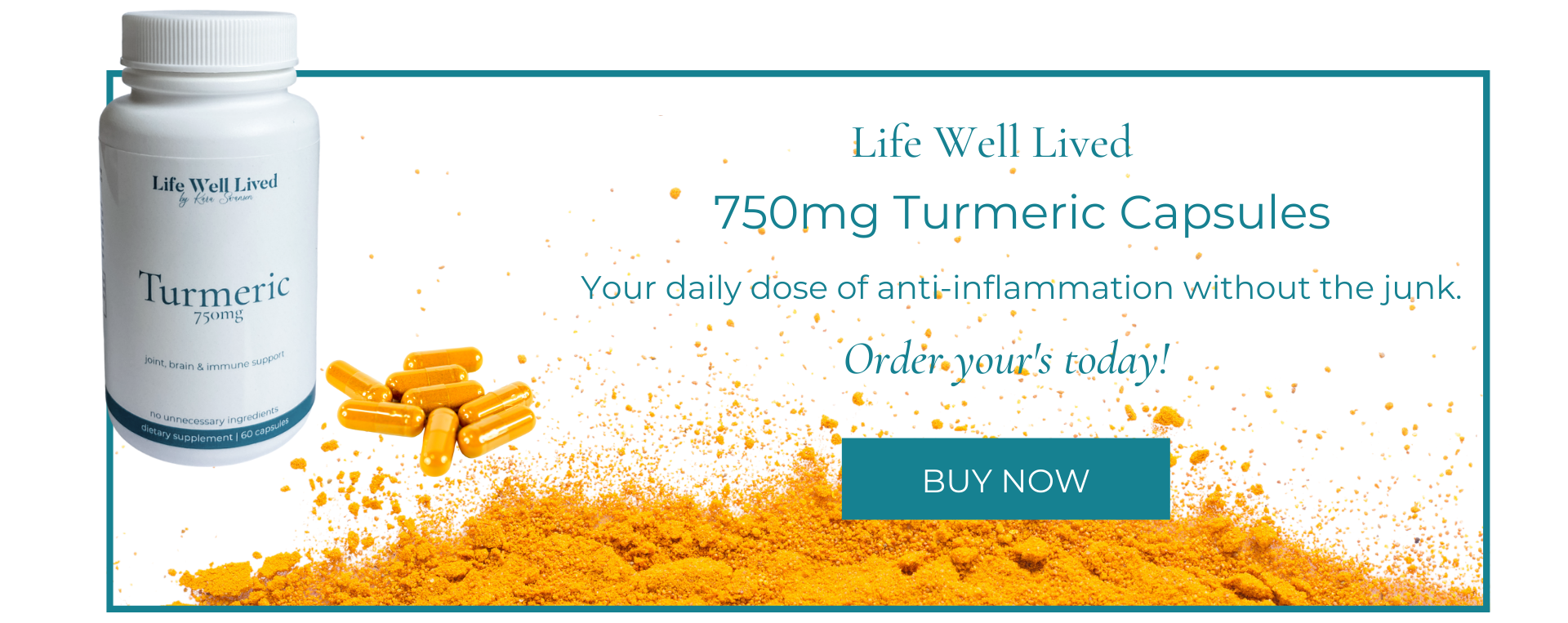How to Reduce Inflammation Without Medication
If the topic of inflammation is an interest to you, you probably feel like you’ve tried EVERYTHING to reduce its pain and discomfort. Well, you’re in the right place. Because today I’m going to give you seven ways to reduce your inflammation without medications.
Inflammation explained
Before we can get into what causes inflammation and how to reduce it, let’s clarify what it is.
Like many things in the health and nutrition space, inflammation can be a confusing topic. You’ve probably heard of acute inflammation and chronic inflammation. But what’s the difference and what causes them?
Well, acute inflammation is our immune system’s response to damaged cells, irritants, and pathogens that contact our skin. This is what you experience when you get a cut or jam your finger. In the case of a cut, the inflammation is there for a time and then goes away as the cut starts to heal.
However, chronic inflammation takes place underneath your skin and affects your organs. This is the bad kind of inflammation we want to avoid. This is probably the type of inflammation that comes to mind when you hear the word.
Chronic inflammation symptoms include:
Fatigue and joint pain but also...
mouth sores
chest pain
Swelling
abdominal pain
fever
rash
Overcoming inflammation without medication
One of the most powerful anti-inflammation result stories I’ve ever seen came from my husband. When he was younger, Noah fractured his right wrist during a basketball game. For the next 15 years, it bothered him almost daily. And some days it got so bad he was unable to workout. And if you know my husband, that’s a big deal for him to skip a workout.
But about two weeks after implementing the very things I’m about to share he came to me one day after a workout. His words, “I’ve never gone two weeks without wrist pain since I was thirteen years old. It’s gotten worse and worse over the years, but now it’s gone away.”
His wrist pain even prevented him from being able to write for long periods of time. About two sentences into writing the pain would move up into his hands into his forearm and make it impossible to continue writing.
But now he’s been pain-free for YEARS.
The women in my Stuck to Thriving program have also seen amazing results in dramatically reducing and even completely eliminating their inflammation.
One lady was in a car accident and suffered from severe inflammation in her ankles for the next five years. But after just a few weeks in Stuck to Thriving, it went away.
And here’s what she had to say:
“For the last 5 years I have had major swelling in my ankles. After following the program for 2-3 weeks my husband and I both noticed my ankles were no longer swollen at the end of the day even after sitting at a desk all day! As a side note after 5 weeks I have lost 15 pounds! I love this program!”
What causes/increases inflammation?
Inflammation is typically caused by one of four things: life habits, the food we eat, genetics, and/or age.
Of course, you can’t do anything about your age or your genetics, but that’s okay.
Because the food you eat and your life habits have a very powerful impact on your inflammation for better or worse.
How to eliminate/lower inflammation naturally
A great deal of your inflammation is caused by the foods you eat and your daily habits. So, I’m going to give you seven things to reduce your inflammation that are within your control.
Decreasing refined carbohydrates
Now, I’m not saying you can no longer have bread. But try to reduce the number of refined carbohydrates like candy, pastries, and other sweetened foods.
Replace them with wholegrain sources instead.
Maintain proper hydration
Water is an essential part of literally every component and function of your body. But not enough of us realized it. In fact, 75% of all American’s suffer from chronic dehydration.
Dehydration leads to a host of problems. Not the least of which is increased inflammation. Because water not only directly increases energy and improves weight management, it also helps reduce and eliminate toxins within your body.
The recommended water consumption can vary based on different factors like weight, activity level, and the climate you live in.
I know it seems so simple but drinking enough water is crucial to your health and even inflammation in your body.
If you want to know exactly how much water your should be consuming each day, input your information in my daily water intake calculator here.
Reduce animal-based foods
Like refined carbohydrates, I’m not telling you to completely eliminate animal-based foods.
But animal-based foods like meat and dairy products have been shown to be one of the most pro-inflammatory foods. Reducing the amount of these foods will help you decrease the amount of inflammation in your body.
Consume turmeric
Turmeric is the number one food on the Anti-Inflammatory Food Index. In fact, studies have shown it to be a more effective anti-inflammatory treatment than common inflammation-fighting medications such as ibuprofen and aspirin, according to a past study.
Unfortunately, turmeric consumed by itself tastes very earthy – kind of like dirt. So, I either mix into my morning smoothie or take two of our Turmeric Capsules. In just two small capsules I can get the daily recommended amount of turmeric.
I talk more about the powerful effects of turmeric in my post, 7 Reasons Women Should Consume Turmeric.
Consume more whole plant-based foods
Consuming more whole plant-based foods has been shown to reduce inflammation in two ways. First, it leaves less room for pro-inflammatory foods like animal proteins and processed foods. And secondly, it provides the anti-inflammatory benefits of plant-based foods like flaxseed.
Flaxseed’s anti-inflammatory properties give it the ability to cut back on inflammation in a powerful way and is one of the reasons I recommend you consume flax meals daily.
Develop proper sleep
Studies often show that the quality of sleep diminishes with age. And with the hustle and bustle of life, it’s easy to overlook the importance of sleep. Between checking emails, binging Netflix, scrolling social media, it can be hard to turn it off at night.
Not getting the ideal amount of sleep – has been shown to trigger inflammation. Even in healthy people. The reason a lack of sleep is so closely associated with inflammation is that during deep sleep cycles, your body is able to perform housekeeping functions, and part of that is reducing inflammation.
A loss of sleep can prompt your immune system to turn against healthy tissue and organs. It can lead to obesity, Type 2 diabetes, and heart disease, as well as dementia and Alzheimer’s.
A lack of sleep and poor sleep hygiene are no joke!
Maintain good gut health
You also need to consider your gut health. Gut health is a hot topic these days. And for good reason! A healthy gut is such an important part of your overall health! But, it’s a delicate thing. Here’s a fact that will blow your mind: the total surface area of your gut is larger than a tennis court… that’s huge! But the even crazier thing is that the lining of your gut is only one cell thick. Now, you see what I mean when I say it’s a delicate thing.
When it comes to improving your gut health there are a couple of things to keep in mind. We usually only hear about probiotics within this conversation. And yes, it’s good to eat probiotic-rich foods such as sauerkraut, kombucha, miso, or kimchi. But it’s also important to consume prebiotics.
Ready to reduce your inflammation?
If you’re experiencing the symptoms of inflammation, then I know you want to live a life without those symptoms. I encourage you to begin with at least one of the above inflammation-reducing practices.
And if you’re ready to make a powerful change, and discover how the women in Stuck to Thriving are reclaiming their lives from inflammation, then I encourage you to book a free call with me. We’ll develop a plan to help you feel amazing and conquer your health goals.






